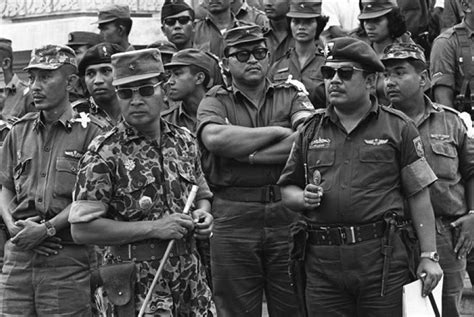The September 30th Movement (G30S/PKI): A Comprehensive Overview and Proposed Solutions
The September 30th Movement, or Gerakan 30 September (G30S), remains a sensitive and complex chapter in Indonesian history. Understanding its intricacies requires a nuanced approach, acknowledging diverse perspectives while striving for factual accuracy. This article aims to provide a comprehensive overview of the G30S/PKI and propose potential solutions to prevent similar events from occurring in the future.
Understanding the G30S/PKI
The G30S/PKI, which took place on September 30th, 1965, involved the kidnapping and murder of six Indonesian Army generals, orchestrated by a group of Indonesian Communist Party (PKI) members and their sympathizers. The event was a significant turning point in Indonesian history, resulting in a period of widespread violence, political upheaval, and the subsequent suppression of the PKI.
The Key Players and Events: The key players involved a complex web of political actors, military figures, and communist party members. The exact motivations and plans remain debated, with different interpretations presented by historians and political analysts. The events of that night unfolded rapidly, leading to a power vacuum and a period of intense uncertainty. The ensuing crackdown targeted alleged communists and sympathizers, resulting in hundreds of thousands of deaths and widespread human rights abuses.
The Aftermath and its Legacy: The aftermath of the G30S/PKI had profound and lasting consequences for Indonesia. The PKI was banned, and the military's influence on politics increased significantly. The event is a recurring topic in Indonesian politics and continues to shape the nation's political landscape. The legacy of the G30S/PKI remains highly sensitive and contentious, influencing contemporary politics and society. It's essential to remember the human cost of this period and to work towards a more inclusive and accurate understanding of these tragic events.
Proposed Solutions for Preventing Future Occurrences
Preventing future occurrences requires a multi-pronged approach that addresses both the underlying causes and the potential triggers for political violence.
1. Fostering Inclusive and Democratic Governance: A strong foundation for preventing future conflicts lies in promoting inclusive and democratic governance structures. This involves guaranteeing the freedom of expression, strengthening institutions that protect human rights, and ensuring fair and transparent elections. A participatory political system allows for a wide range of voices to be heard, reducing the potential for marginalized groups to resort to violence.
2. Strengthening Civil Society and Promoting Dialogue: A vibrant civil society can play a crucial role in promoting dialogue, mitigating tensions, and acting as a check on potential abuses of power. Independent organizations can work to build bridges between different groups and promote peaceful means of conflict resolution. Open and constructive dialogue is critical in addressing historical grievances and fostering reconciliation.
3. Promoting Critical Thinking and Historical Education: Accurate and unbiased historical education is vital in preventing the recurrence of such events. Promoting critical thinking skills allows individuals to analyze information objectively and avoid falling prey to misinformation and propaganda. Education should also address the consequences of political violence and the importance of peaceful conflict resolution.
4. Strengthening Rule of Law and Judicial Reform: Strengthening the rule of law is crucial in preventing future abuses of power. Independent and impartial judicial institutions are needed to ensure accountability for human rights violations. This includes ensuring access to justice for victims of political violence and enacting measures to prevent future abuses.
5. Regional Cooperation and International Monitoring: International cooperation can play an important role in monitoring potential threats and fostering stability. Sharing information and best practices in conflict prevention can help countries identify and address early warning signs. Independent international monitoring can also contribute to accountability and the prevention of human rights abuses.
Conclusion:
The G30S/PKI represents a deeply painful chapter in Indonesian history. Understanding its complexity and learning from its mistakes are critical for preventing future conflicts. By fostering inclusive governance, strengthening civil society, promoting historical education, strengthening the rule of law, and promoting regional cooperation, Indonesia can build a more peaceful and stable future. Continuous vigilance and a commitment to democratic values are crucial for ensuring that such events never again darken the nation's history.
